You are using an out of date browser. It may not display this or other websites correctly.
You should upgrade or use an alternative browser.
You should upgrade or use an alternative browser.
Essential The Africa the Media Doesn't Tell You About
- Thread starter TommyHilltrigga
- Start date
More options
Who Replied?25 December 2014 - 22H25
Morocco bans Ridley Scott's 'Exodus'

© AFP/File | (L-R) Joel Edgerton, Golshifteh Farahani, Maria Valverde and Christian Bale at the world premier of "Exodus: Gods and Kings" in London on December 3, 2014
RABAT (AFP) -
Morocco has banned cinemas from showing the biblical epic "Exodus: Gods and Kings" just one day before the Hollywood blockbuster was due to be screened, media reports said Thursday.
It was unclear why officials decided to ban the movie which had been given the green light by the state-run Moroccan Cinema Centre (CCM), which implements all rules concerning the industry.
Theatre managers said they received "verbal" instructions from the CCM not to begin screening the movie as planned on Wednesday, according to news website media24.
Others said CCM officials had informed them of the ban in person.
Hassan Belkady, who runs Cinema Rif in Casablanca, told media24 that he had been threatened with the closure of the business if he refused to implement the ban.
"They phoned and threatened they would shut down the theatre if I did not take the film off the schedule," said Belkady.
The managers of the Renaissance cinema in Rabat said they were told the ban was nationwide, reported TelQuel magazine.
CCM chief Sarim Fassi-Fihri declined to comment on the decision.
Ridley Scott's historical blockbuster stars Christian Bale as Moses and retells his exodus from Egypt.
Moses is an important figure revered by Jews, Christians and Muslims alike.
Muslims consider Moses a prophet and Islam opposes the depiction of its prophets.
Morocco bans Ridley Scott's 'Exodus'

© AFP/File | (L-R) Joel Edgerton, Golshifteh Farahani, Maria Valverde and Christian Bale at the world premier of "Exodus: Gods and Kings" in London on December 3, 2014
RABAT (AFP) -
Morocco has banned cinemas from showing the biblical epic "Exodus: Gods and Kings" just one day before the Hollywood blockbuster was due to be screened, media reports said Thursday.
It was unclear why officials decided to ban the movie which had been given the green light by the state-run Moroccan Cinema Centre (CCM), which implements all rules concerning the industry.
Theatre managers said they received "verbal" instructions from the CCM not to begin screening the movie as planned on Wednesday, according to news website media24.
Others said CCM officials had informed them of the ban in person.
Hassan Belkady, who runs Cinema Rif in Casablanca, told media24 that he had been threatened with the closure of the business if he refused to implement the ban.
"They phoned and threatened they would shut down the theatre if I did not take the film off the schedule," said Belkady.
The managers of the Renaissance cinema in Rabat said they were told the ban was nationwide, reported TelQuel magazine.
CCM chief Sarim Fassi-Fihri declined to comment on the decision.
Ridley Scott's historical blockbuster stars Christian Bale as Moses and retells his exodus from Egypt.
Moses is an important figure revered by Jews, Christians and Muslims alike.
Muslims consider Moses a prophet and Islam opposes the depiction of its prophets.
Patrice Lumumba: the most important assassination of the 20th century
The US-sponsored plot to kill Patrice Lumumba, the hero of Congolese independence, took place 50 years ago today
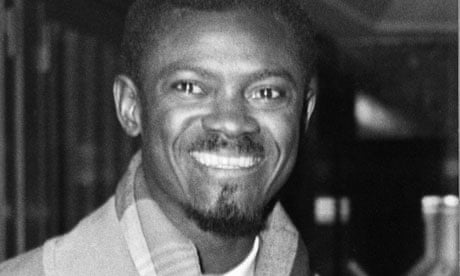
Patrice Lumumba became the first prime minister of the Democratic Republic of the Congo in 1960, and was killed in 1961. Photograph: EPA -/EPA
Georges Nzongola-Ntalaja
Monday 17 January 201105.39 EST
7429
Comments
30
Patrice Lumumba, the first legally elected prime minister of the Democratic Republic of the Congo (DRC), was assassinated 50 years ago today, on 17 January, 1961. This heinous crime was a culmination of two inter-related assassination plots by American and Belgian governments, which used Congolese accomplices and a Belgian execution squad to carry out the deed.
Ludo De Witte, the Belgian author of the best book on this crime, qualifies it as "the most important assassination of the 20th century". The assassination's historical importance lies in a multitude of factors, the most pertinent being the global context in which it took place, its impact on Congolese politics since then and Lumumba's overall legacy as a nationalist leader.
For 126 years, the US and Belgium have played key roles in shaping Congo's destiny. In April 1884, seven months before the Berlin Congress, the US became the first country in the world to recognise the claims of King Leopold II of the Belgians to the territories of the Congo Basin.
When the atrocities related to brutal economic exploitation in Leopold's Congo Free State resulted in millions of fatalities, the US joined other world powers to force Belgium to take over the country as a regular colony. And it was during the colonial period that the US acquired a strategic stake in the enormous natural wealth of the Congo, following its use of the uranium from Congolese mines to manufacture the first atomic weapons, the Hiroshima and Nagasaki bombs.
With the outbreak of the cold war, it was inevitable that the US and its western allies would not be prepared to let Africans have effective control over strategic raw materials, lest these fall in the hands of their enemies in the Soviet camp. It is in this regard that Patrice Lumumba's determination to achieve genuine independence and to have full control over Congo's resources in order to utilise them to improve the living conditions of our people was perceived as a threat to western interests. To fight him, the US and Belgium used all the tools and resources at their disposal, including the United Nations secretariat, under Dag Hammarskjöld and Ralph Bunche, to buy the support of Lumumba's Congolese rivals , and hired killers.
In Congo, Lumumba's assassination is rightly viewed as the country's original sin. Coming less than seven months after independence (on 30 June, 1960), it was a stumbling block to the ideals of national unity, economic independence and pan-African solidarity that Lumumba had championed, as well as a shattering blow to the hopes of millions of Congolese for freedom and material prosperity.
The assassination took place at a time when the country had fallen under four separate governments: the central government in Kinshasa (then Léopoldville); a rival central government by Lumumba's followers in Kisangani (then Stanleyville); and the secessionist regimes in the mineral-rich provinces of Katanga and South Kasai. Since Lumumba's physical elimination had removed what the west saw as the major threat to their interests in the Congo, internationally-led efforts were undertaken to restore the authority of the moderate and pro-western regime in Kinshasa over the entire country. These resulted in ending the Lumumbist regime in Kisangani in August 1961, the secession of South Kasai in September 1962, and the Katanga secession in January 1963.
No sooner did this unification process end than a radical social movement for a "second independence" arose to challenge the neocolonial state and its pro-western leadership. This mass movement of peasants, workers, the urban unemployed, students and lower civil servants found an eager leadership among Lumumba's lieutenants, most of whom had regrouped to establish a National Liberation Council (CNL) in October 1963 in Brazzaville, across the Congo river from Kinshasa. The strengths and weaknesses of this movement may serve as a way of gauging the overall legacy of Patrice Lumumba for Congo and Africa as a whole.
The most positive aspect of this legacy was manifest in the selfless devotion of Pierre Mulele to radical change for purposes of meeting the deepest aspirations of the Congolese people for democracy and social progress. On the other hand, the CNL leadership, which included Christophe Gbenye and Laurent-Désiré Kabila, was more interested in power and its attendant privileges than in the people's welfare. This is Lumumbism in words rather than in deeds. As president three decades later, Laurent Kabila did little to move from words to deeds.
More importantly, the greatest legacy that Lumumba left for Congo is the ideal of national unity. Recently, a Congolese radio station asked me whether the independence of South Sudan should be a matter of concern with respect to national unity in the Congo. I responded that since Patrice Lumumba has died for Congo's unity, our people will remain utterly steadfast in their defence of our national unity.
• Georges Nzongola-Ntalaja is professor of African and Afro-American studies at the University of North Carolina at Chapel Hill and author of The Congo from Leopold to Kabila: A People's History
The US-sponsored plot to kill Patrice Lumumba, the hero of Congolese independence, took place 50 years ago today

Patrice Lumumba became the first prime minister of the Democratic Republic of the Congo in 1960, and was killed in 1961. Photograph: EPA -/EPA
Georges Nzongola-Ntalaja
Monday 17 January 201105.39 EST
- Share on Facebook
- Share on Twitter
- Share via Email
- Share on LinkedIn
- Share on Google+
7429
Comments
30
Patrice Lumumba, the first legally elected prime minister of the Democratic Republic of the Congo (DRC), was assassinated 50 years ago today, on 17 January, 1961. This heinous crime was a culmination of two inter-related assassination plots by American and Belgian governments, which used Congolese accomplices and a Belgian execution squad to carry out the deed.
Ludo De Witte, the Belgian author of the best book on this crime, qualifies it as "the most important assassination of the 20th century". The assassination's historical importance lies in a multitude of factors, the most pertinent being the global context in which it took place, its impact on Congolese politics since then and Lumumba's overall legacy as a nationalist leader.
For 126 years, the US and Belgium have played key roles in shaping Congo's destiny. In April 1884, seven months before the Berlin Congress, the US became the first country in the world to recognise the claims of King Leopold II of the Belgians to the territories of the Congo Basin.
When the atrocities related to brutal economic exploitation in Leopold's Congo Free State resulted in millions of fatalities, the US joined other world powers to force Belgium to take over the country as a regular colony. And it was during the colonial period that the US acquired a strategic stake in the enormous natural wealth of the Congo, following its use of the uranium from Congolese mines to manufacture the first atomic weapons, the Hiroshima and Nagasaki bombs.
With the outbreak of the cold war, it was inevitable that the US and its western allies would not be prepared to let Africans have effective control over strategic raw materials, lest these fall in the hands of their enemies in the Soviet camp. It is in this regard that Patrice Lumumba's determination to achieve genuine independence and to have full control over Congo's resources in order to utilise them to improve the living conditions of our people was perceived as a threat to western interests. To fight him, the US and Belgium used all the tools and resources at their disposal, including the United Nations secretariat, under Dag Hammarskjöld and Ralph Bunche, to buy the support of Lumumba's Congolese rivals , and hired killers.
In Congo, Lumumba's assassination is rightly viewed as the country's original sin. Coming less than seven months after independence (on 30 June, 1960), it was a stumbling block to the ideals of national unity, economic independence and pan-African solidarity that Lumumba had championed, as well as a shattering blow to the hopes of millions of Congolese for freedom and material prosperity.
The assassination took place at a time when the country had fallen under four separate governments: the central government in Kinshasa (then Léopoldville); a rival central government by Lumumba's followers in Kisangani (then Stanleyville); and the secessionist regimes in the mineral-rich provinces of Katanga and South Kasai. Since Lumumba's physical elimination had removed what the west saw as the major threat to their interests in the Congo, internationally-led efforts were undertaken to restore the authority of the moderate and pro-western regime in Kinshasa over the entire country. These resulted in ending the Lumumbist regime in Kisangani in August 1961, the secession of South Kasai in September 1962, and the Katanga secession in January 1963.
No sooner did this unification process end than a radical social movement for a "second independence" arose to challenge the neocolonial state and its pro-western leadership. This mass movement of peasants, workers, the urban unemployed, students and lower civil servants found an eager leadership among Lumumba's lieutenants, most of whom had regrouped to establish a National Liberation Council (CNL) in October 1963 in Brazzaville, across the Congo river from Kinshasa. The strengths and weaknesses of this movement may serve as a way of gauging the overall legacy of Patrice Lumumba for Congo and Africa as a whole.
The most positive aspect of this legacy was manifest in the selfless devotion of Pierre Mulele to radical change for purposes of meeting the deepest aspirations of the Congolese people for democracy and social progress. On the other hand, the CNL leadership, which included Christophe Gbenye and Laurent-Désiré Kabila, was more interested in power and its attendant privileges than in the people's welfare. This is Lumumbism in words rather than in deeds. As president three decades later, Laurent Kabila did little to move from words to deeds.
More importantly, the greatest legacy that Lumumba left for Congo is the ideal of national unity. Recently, a Congolese radio station asked me whether the independence of South Sudan should be a matter of concern with respect to national unity in the Congo. I responded that since Patrice Lumumba has died for Congo's unity, our people will remain utterly steadfast in their defence of our national unity.
• Georges Nzongola-Ntalaja is professor of African and Afro-American studies at the University of North Carolina at Chapel Hill and author of The Congo from Leopold to Kabila: A People's History
Postcards from home: documenting Nigeria's floating community
From Soni Methu, CNN
updated 9:38 AM EST, Wed December 24, 2014
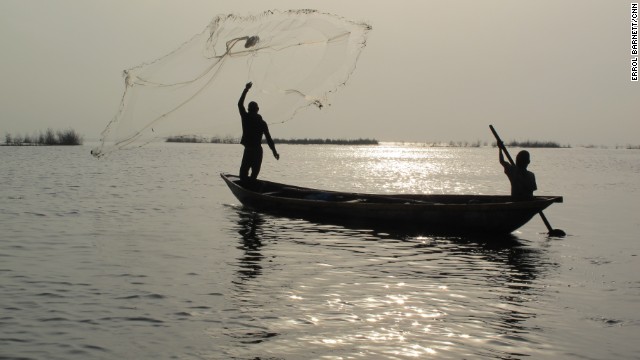
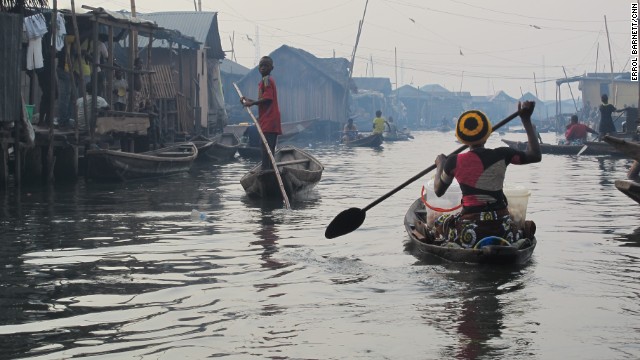
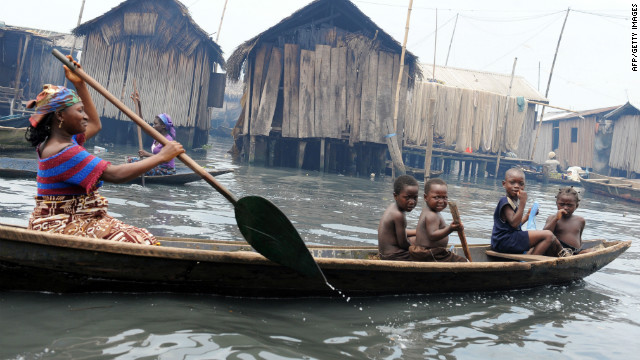
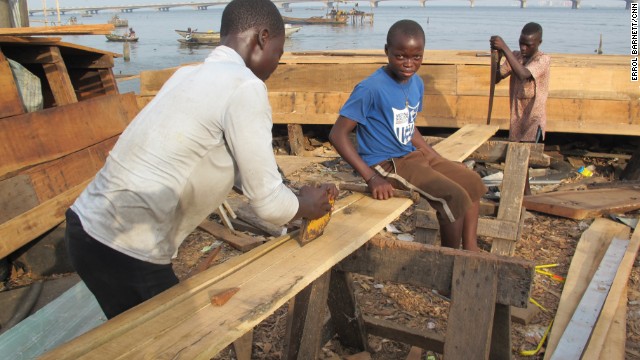
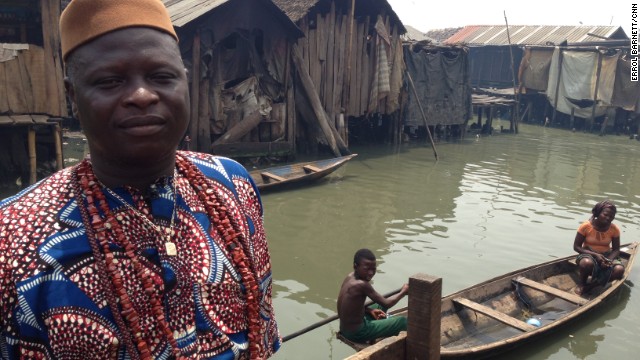
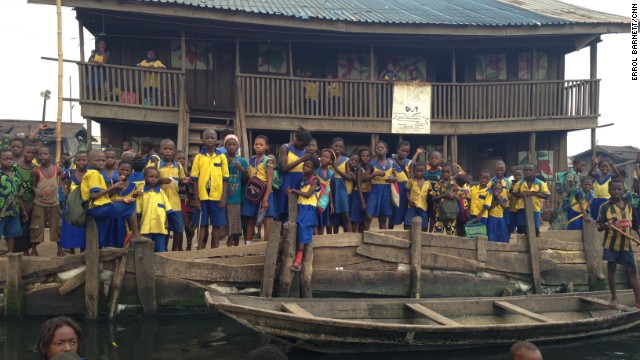
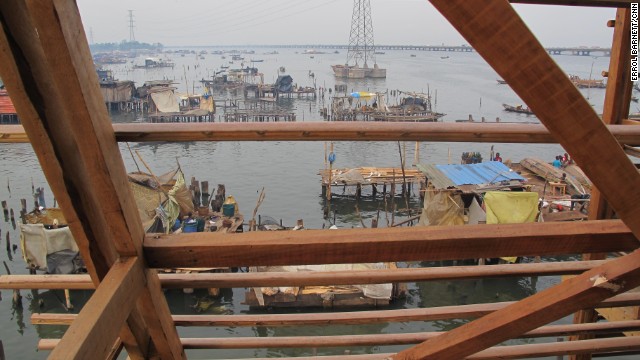
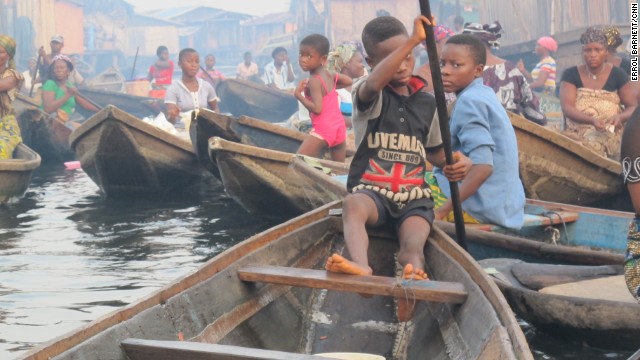
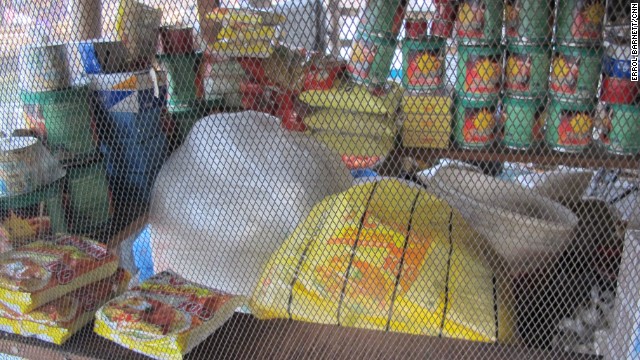
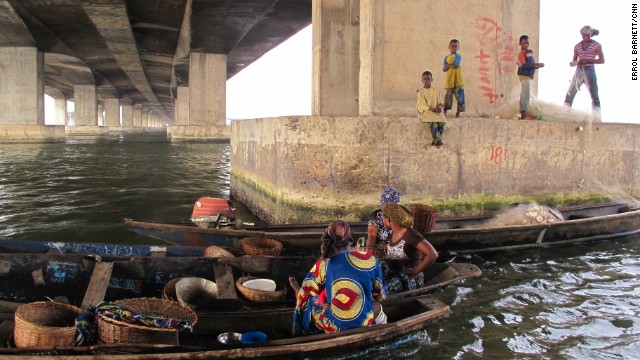
Inside Africa takes its viewers on a journey across Africa, exploring the true diversity and depth of different cultures, countries and regions.
(CNN) -- Some call Makoko the "Venice of Africa".
But while the intricate waterways may replicate the layout of the picturesque Italian city, living conditions could hardly be more contrasting.
Makeshift houses with corrugated iron roofs balance precariously atop stilts. Down below, narrow wooden boats act as a form of aquatic taxi ferrying goods and people around the bustling community.
"I started my photography here in Makoko," Afose told CNN when we meet at the plush surrounds of the 2014 Lagos Photo Festival.
"It's really inspiring .... I've been able to get a lot of inspiration in terms of seeing a lot of things in my community," he added.
Afose's career has really begun to take off in recent years. After learning his craft in workshops put on by the African Artists Foundation he went on to study photojournalism at the Nigerian Institute of Journalism.
He's since had photos exhibited at various national arts and photography festivals as well as appearing in numerous international magazines and publications.
International collaboration
Afose has even worked alongside the respected Spanish photographer Cristina De Middel.
"(I am) happy to see some of my work published," he said. "And to see the fact of my name written on the pictures is something very great."
Yet despite the international recognition, its the daily hustle and bustle of Makoko that continues to inspire Afose. He explains that his knowledge of the local customs, attitudes and the people who live there gives him an edge over those who may come from outside to document life in the community.
"To tell the story with this (holding up a camera), you have to know who this guy is (pointing to a man in a photograph)."
Just by looking at him, "is he happy or is he not happy? You have to try to know what it is all about.
"You can't just pick up your camera and start shooting," he said.
Here and now
Then there's the skill vital for any photojournalist to develop, the handy knack of being in the right place at the right time.
Afose was rapidly on the spot when a fire that tore through part of Makoko in 2013. The scenes were horrific but the images Afose captured told the story and brought some of the harsh realities of life in the slum to the outside world. They appeared in numerous publications in print and online.
"The fire was caused by a generator and it burned a lot of houses in the community," Afose explained.
"I had the opportunity to get there at the right time and try document what the scene was all about, what caused the scene (and) what caused the fire outbreak," he added.
It is likely the Makoko fire wouldn't have garnered as much attention in the national and international press without Afose's timely and grabbing images.
The experience has made him even more aware of the importance of having local people tell the story of the community there. So much so that it has inspired him on to his next challenge.
"I want to go further, I want to know more," he said.
When pushed on what this means, he added, "you know, maybe having a university degree (so I can) come back to the community and teach people ... to become what I am today."
Maybe then the outside world will be able to appreciate even more of life in Makoko through the sharp-shooting eyes of its residents.
From Soni Methu, CNN
updated 9:38 AM EST, Wed December 24, 2014










Inside Africa takes its viewers on a journey across Africa, exploring the true diversity and depth of different cultures, countries and regions.
(CNN) -- Some call Makoko the "Venice of Africa".
But while the intricate waterways may replicate the layout of the picturesque Italian city, living conditions could hardly be more contrasting.
Makeshift houses with corrugated iron roofs balance precariously atop stilts. Down below, narrow wooden boats act as a form of aquatic taxi ferrying goods and people around the bustling community.
"I started my photography here in Makoko," Afose told CNN when we meet at the plush surrounds of the 2014 Lagos Photo Festival.
"It's really inspiring .... I've been able to get a lot of inspiration in terms of seeing a lot of things in my community," he added.
Afose's career has really begun to take off in recent years. After learning his craft in workshops put on by the African Artists Foundation he went on to study photojournalism at the Nigerian Institute of Journalism.
He's since had photos exhibited at various national arts and photography festivals as well as appearing in numerous international magazines and publications.
International collaboration
Afose has even worked alongside the respected Spanish photographer Cristina De Middel.
"(I am) happy to see some of my work published," he said. "And to see the fact of my name written on the pictures is something very great."
Yet despite the international recognition, its the daily hustle and bustle of Makoko that continues to inspire Afose. He explains that his knowledge of the local customs, attitudes and the people who live there gives him an edge over those who may come from outside to document life in the community.
"To tell the story with this (holding up a camera), you have to know who this guy is (pointing to a man in a photograph)."
Just by looking at him, "is he happy or is he not happy? You have to try to know what it is all about.
"You can't just pick up your camera and start shooting," he said.
Here and now
Then there's the skill vital for any photojournalist to develop, the handy knack of being in the right place at the right time.
Afose was rapidly on the spot when a fire that tore through part of Makoko in 2013. The scenes were horrific but the images Afose captured told the story and brought some of the harsh realities of life in the slum to the outside world. They appeared in numerous publications in print and online.
"The fire was caused by a generator and it burned a lot of houses in the community," Afose explained.
"I had the opportunity to get there at the right time and try document what the scene was all about, what caused the scene (and) what caused the fire outbreak," he added.
It is likely the Makoko fire wouldn't have garnered as much attention in the national and international press without Afose's timely and grabbing images.
The experience has made him even more aware of the importance of having local people tell the story of the community there. So much so that it has inspired him on to his next challenge.
"I want to go further, I want to know more," he said.
When pushed on what this means, he added, "you know, maybe having a university degree (so I can) come back to the community and teach people ... to become what I am today."
Maybe then the outside world will be able to appreciate even more of life in Makoko through the sharp-shooting eyes of its residents.
TMNT4000
Superstar
Good. Even though it's probably for an entirely different reason than us. Egypt needs to get on board too.25 December 2014 - 22H25
Morocco bans Ridley Scott's 'Exodus'

© AFP/File | (L-R) Joel Edgerton, Golshifteh Farahani, Maria Valverde and Christian Bale at the world premier of "Exodus: Gods and Kings" in London on December 3, 2014
RABAT (AFP) -
Morocco has banned cinemas from showing the biblical epic "Exodus: Gods and Kings" just one day before the Hollywood blockbuster was due to be screened, media reports said Thursday.
It was unclear why officials decided to ban the movie which had been given the green light by the state-run Moroccan Cinema Centre (CCM), which implements all rules concerning the industry.
Theatre managers said they received "verbal" instructions from the CCM not to begin screening the movie as planned on Wednesday, according to news website media24.
Others said CCM officials had informed them of the ban in person.
Hassan Belkady, who runs Cinema Rif in Casablanca, told media24 that he had been threatened with the closure of the business if he refused to implement the ban.
"They phoned and threatened they would shut down the theatre if I did not take the film off the schedule," said Belkady.
The managers of the Renaissance cinema in Rabat said they were told the ban was nationwide, reported TelQuel magazine.
CCM chief Sarim Fassi-Fihri declined to comment on the decision.
Ridley Scott's historical blockbuster stars Christian Bale as Moses and retells his exodus from Egypt.
Moses is an important figure revered by Jews, Christians and Muslims alike.
Muslims consider Moses a prophet and Islam opposes the depiction of its prophets.
Good. Even though it's probably for an entirely different reason than us. Egypt needs to get on board too.
Egypt bans Exodus Hollywood film

Continue reading the main story
Related Stories
- Muted opening weekend for epic Moses
- Epic row over final cut of Noah film
- The biblical epic makes a comeback
The head of the censorship board said these included a claim that the Pyramids were built by Jews, and that an earthquake, not a miracle by Moses, caused the Parting of the Red Sea.
Exodus: Gods and Kings stars Christian Bale as Moses.
There have also been reports that the film is banned in Morocco.
Although the state-run Moroccan Cinema Centre (CCM) had given the film the green light, media reports said that officials had decided to ban the movie from being screened the day before its premiere.
Exodus, which cost a reported $140m (£89m) to make, took $24.5m (£15.5m) on its debut weekend.

Mixed reviews
The biblical epic, which stars Christian Bale as Moses, overtook the third instalment of The Hunger Games, following three weeks at number one. However, it has had mixed reviews.
Time called it a "cinematically uninspired retelling of the Moses story",Vulture said it was "as uneven as Ridley Scott's career", while the New York Times described it as "both woefully insufficient and much too much".
The film's opening fell well short of other modern biblical epics, including Darren Aronofsky's Noah which took $43.7m (£27.7m) on its opening weekend in March and 2004's The Passion of the Christ, which took $83.3m (£52.9m).
Nigeria’s presidential election on Saturday, February 14, 2015. Nigeria, Africa’slargest economy and the continent’s biggest oil-producer, holds elections in February.President Goodluck Jonathan of the People’s Democratic Party (which has governed since 1999) is running for reelection, despite doubts about his constitutionaleligibility. He is favored to win. Possible candidates for the opposition All Progressives Congress include former military ruler Muhammadu Buhari, former Vice PresidentAtiku Abubakar, and Kano Governor Rabi’u Musa Kwankwaso. Whoever wins will have a lot to do. Nigeria’s poverty rate stands around 33 percent, and unemployment is high. Making matters worse, the Nigerian economy faces tough headwinds. Oil prices are tumbling, and corruption in the oil industry and oil theft continue. Northern Nigeria continues to be plagued by violence directed by Boko Haram, a militant group that gained international attention this year after it kidnapped over two hundred schoolgirls from Chibok. (My colleague John Campbell, a former U.S. ambassador to Nigeria, has written on what Washington should do to counter Boko Haram.) Nigeria’s election could itself be a source of violence. Tensions between the predominantly Muslim north and predominantly Christian south run high; many Muslims believe that Jonathan has violated the informal practice by which the Nigerian presidency alternates between Christians and Muslims.
http://blogs.cfr.org/lindsay/2014/12/08/ten-elections-to-watch-in-2015/
http://blogs.cfr.org/lindsay/2014/12/08/ten-elections-to-watch-in-2015/
I go to Lagos and Abuja every other year, it is always good to see progress. I'd also like to visit other parts of Nigeria and the rest of Africa but I have no idea where to begin. What people need to remember is a lot of these African countries only gained their independence 50/60 years years ago. Yes there challenges but deep down I believe we will get in right in our lifetime and if not in ours, in our children's.
Africa’s Largest Wind Farm
ENERGY INDEPENDENCE
by Joe Gurowsky | on December 24th, 2014 | 0 Comments

Photo: Standard Digital News, Kenya
After eight years of planning, funds have become available for the planned 310 megawatt (MW) Lake Turkana wind farm project estimated to cost $775 million – the largest private investment in Kenya’s history. The project will be the largest wind farm in Africa and when completed is expected to generate around 20 percent of Kenya’s current electricity generating capacity. The project site is near Lake Turkana in northern Kenya and is an especially attractive location perched up to 7,500 feet above sea-level, with consistent and predictable wind patterns. However, the site also represents many challenges that have been overcome including: it is far removed from a population center; there is little infrastructure to move heavy machinery; and a 265 mile transmission line needs to be constructed to evacuate the power to Suswa, 55 miles north of the Nairobi area and the national grid.
Despite these and additional obstacles, the six member joint venture project developers, Lake Turkana Wind Power (LTWP), which will own and operate the project, attracted financial support from 11 funding sources in an extremely complex structure that took more than four years to materialize composed of: the African Development Bank (AfDB), European Investment Bank (EIB), the Standard Bank of South Africa, Nedbank, Netherlands Development Finance Company (FMO), Proparco, East African Development Bank (EADB), PTA Bank, EKF, Triodos, and DEG.
To overcome one of the major hurdles and reach financial close on Dec. 11 of this year, it proved essential the AfDB finalized a $24.5 million partial risk guarantee (PRG). The PRG is structured to protect LTWP against the risk of potential construction delays to the 265 mile transmission line and substations and ensure the developers will get paid for electricity generated once the wind farm begins producing scheduled power. The transmission line and related substations are to be financed by the Government of Spain and Government of Kenya and construction has been contracted to state company Kenya Electricity Transmission Company (Ketraco). To underscore the importance, this is the AfDB’s first PRG transaction.
“It has been a long journey,” Kenya’s secretary for finance Henry Rotich, said at the signing of the guarantee. “I hope now we have resolved everything and we look forward to the groundbreaking.”
Previously securing a power purchase agreement (PPA) between LTWP and Kenya Power and Lighting Company (KP) was a separate milestone as well. Essentially a PPA is an agreement where an electricity producer sells electricity to a power distributor for a negotiated price. In this instance the agreed PPA states the electricity produced by LTWP will be bought at a fixed price of Ksh9/kWh ($0.09/kWh equivalent on December 22) by Kenya Power over a 20-year period.
Kwame Parker, Standard Bank’s (one of the lead arrangers of debt financing) East Africa Head of Power and Infrastructure stated the project “is designed to provide a clean source of electricity to Kenya. It will not only contribute to the social and economic development of Kenya, but will also contribute towards Kenya’s goal of significantly increasing its installed capacity and reducing its reliance on more expensive sources of power.”
If all goes according to plan, 50 MW of power can be operational in 27 months and the balance can come online five months later.
An Eye on the Future
The wind farm will be one key accelerant to meet the government’s goal of scaling power generation to 5,000 MW by 2017, reducing shortages, and providing affordable tariffs. Currently there is a severely insufficient 1,700 MW of power capacity plus demand is continually increasing to boot. Such shortfalls stagnates economic growth due clouding investment attractiveness due to uncertainty of consistent electricity supplies and frequent blackouts.
According to the Kenyan government’s projections through 2029, Kenya will need additional installed electric energy capacity of 7,500 MW by 2029.
There are other wind projects in the pipeline and geothermal energy has vast potential, while trying to reduce reliance on external sources of energy. There is the goal that the Power Africa initiative, with Kenya as a priority country, will also help develop more projects to close the gap.
Improving Energy Security
Lake Turkana wind farm is front and center as the Kenyan government is seeking to reduce its reliance on imported energy and fossil fuel while ensuring a reliable supply of electricity based on clean low-cost energy. Kenya produces almost no oil or natural gas, and has to import the fossil fuels that it needs. The wind project will allow the country to avoid paying more than $150 million in fuel costs each year.
Kenya also understands the need for joining power pools to increase security and last week signed an agreement with Zambia and Tanzania to build a joint transmission line to facilitate trade of power to reduce average energy costs, improve reliability, and provide security for power supply to both Eastern and Southern Africa.
Basics still needed
Now that the hurdle of pricing and the transmission line are moving along for Lake Turkana, major infrastructure upgrades need to be in place to efficiently move the equipment to the project site. Part of the project design does include reinforcing 125 miles of roads and bridges to ensure safe delivery of the turbines from the port at Mombasa. Furthermore, site access roads will be needed. LTWP will be covering those costs. The rail network also needs to be strengthened.
The new transmission line can also serve as a major conduit for other power projects, such as Olkaria, and feeder lines down the road and avoid the large transmission cost.
The Technology
Vestas, a Danish wind energy powerhouse, secured a firm and unconditional order to provide 365 turbines to tally 310 MW of the planned project capacity – the largest order in terms of number of turbines in company history. The scope of the contract is for supply, installation, and commissioning of the wind turbines as well as a 15-year service agreement.
For perspective, Vestas owns 19 percent of the global installed wind energy capacity total. Vestas is responsible for 60 gigawatts (GW) of the global 318 GW, according to the Vestas Performance & Diagnostic Center and the Global Wind Statistics 2013.
Carbon Offset
The wind farm is registered with the United Nations Framework Convention on Climate Change (UNFCCC) and approved at the Gold Standard rating. The project is forecast to reduce carbon emissions by 16 million tons during its 20-year lifespan and the new income from the carbon credits will be given to with the government and invested in the community.
The Big Picture
As mentioned, to meet Kenya’s electricity demands in gross numbers, Lake Turkana is only part of the big picture, but it can serve as a great example for future large-scale windfarms and developers. With a successful project, a fruitful story will be present which can demonstrate Kenyans’ demands and further stimulate the investment environment for a power starved country. It can be transformative in terms of accelerating additional projects that will benefit development of Kenya, the nation’s electricity sector, and to the country as a whole.
http://foreignpolicyblogs.com/2014/12/24/africas-largest-wind-farm/
Will 2015 be a year of political change for Africa?
Analysis: African voters will voice their discontent in major elections in Nigeria, Burkina Faso
December 25, 2014 6:30PM ET
by Sean Jacobs @AfricasaCountry
Ebola dominated the headlines about Africa in 2014, but while the Western media was caught up in hysteria, the key lesson of the outbreak was the dysfunctional state of health infrastructure in West Africa and the lack of a coordinated continental response. And, a new Cambridge University study suggests, policies imposed by the International Monetary Fund had led African governments to slash spending on the public health system, leaving them unable to hire and train sufficient staff to cope with the crisis.
But the picture wasn’t all gloomy. Nigeria, despite its dysfunction and corruption, impressed the world with a public health response that effectively contained Ebola. African musicians like Salif Keita and Amadou and Mariam released an Ebola song that delivered crucial information about how to prevent infection. For all the hype and bluster in U.S. media, it was local doctors and medical personnel that bore the brunt of the burden of fighting Ebola in Africa, while more direct medical assistance came from Cuba than from the United States.
Nigeria, which claims to be Africa’s largest democracy and is now also the continent’s largest economy, was more effective in containing Ebola than in coping with the menace of Boko Haram. The extremist group’s abduction of more than 200 schoolgirls in May drew international attention, prompting promises of swift and decisive action by President Goodluck Jonathan.
Most of the girls were never returned, making Jonathan the target of vehement public criticism, but he is still expected to easily win February’s presidential election. Jonathan maintains solid support among Evangelical megachurches (a big factor in Nigerian politics), major media houses and local celebrities, while the weakness of civil society means he faces little opposition. His election opponent, Muhammedu Buhari, is a former military ruler from the 1980s with little support among Nigeria’s elites. Buhari’s erstwhile support for Sharia rule means he faces strong opposition in the south. (Turnout in the north will be lower because of the Boko Haram threat.)
Africa will see several other notable elections in 2015, beginning with Egypt’s parliamentary poll in March. With the Muslim Brotherhood and its associated political party still banned, any election will be easily won by parties allied with the military and President Abdel Fattah al-Sisi. No surprises are expected, either, in the April election in Sudan, where President Omar Al Bashir has been in power since 1989.
Burkina Faso’s November 2015 election is more significant – it marks the first time in the country’s history that the Burkinabé will get to choose their government. A youth-led uprising forced the dictator Blaise Compaoré to flee the country on Oct. 31, after 27 years in power, and he is reportedly in exile in Morocco.
Although it has no election scheduled, South Africa could unseat President Jacob Zuma next year. Tainted by allegations of corruption, Zuma is increasingly unpopular among the electorate and within his own party, the African National Congress (ANC). Zuma has been ordered by South Africa’s public protector to repay the state for $24 million in unauthorized renovations to a private property in his home province of Kwazulu-Natal. Meanwhile, the ANC under his stewardship has splintered in the face of challenges from the more left-wing Economic Freedom Front and a trade union-based United Front movement. But Zuma is a canny operator, and it’s not clear that his critics can muster a majority to oust him.
Uganda’s President Yoweri Museveni, who championed his country’s assaults on gay rights, is hoping to make 2015 the year that African leaders withdraw from the International Criminal Court (ICC). Of the 21 open cases before the court, all have Africans defendants. That does not sit well with many African leaders, who ask why Western politicians such as George W. Bush, dikk Cheney and Tony Blair have not been brought to book by the ICC over the invasion of Iraq.
The ICC nevertheless provides an important, if flawed, bulwark against impunity for African leaders. The court’s recent decision to drop charges against Kenyan leader Uhuru Kenyatta could, paradoxically, strengthen the ICC’s legitimacy in African eyes by showing that the outcome of its proceedings is not predetermined. As University of Florida political scientist Oumar Ba argues, the Kenyatta case may spur a change in prosecutorial strategy, prompting the court to investigate specific human rights abuses in detail before deciding who to level charges against.
The continent gets a break from public health and politics in January when the bi-annual Africa Cup of Nations kicks off, featuring some of the finest players in international soccer—most of whom are based in Europe. The tournament will be held in Equatorial Guinea after the original host, Morocco, withdrew over concerns that Western anxiety about Ebola could harm Morocco’s critically important tourism industry. Soccer enthusiasts will be watching closely to see whether Cote d’Ivoire’s “golden generation” — led by Didier Drogba and the Toure brothers – finally win lift the silverware that has long eluded them, in a tournament that may be their swansong.
Finally, we can’t promise that 2015 will be the year that passes without some public figure referring to Africa as a country. 2014’s offenders include Vice President Joe Biden, House Speaker Nancy Pelosi, aging rocker Steven Tyler, Arsenal manager Arsene Wenger, Australian foreign minister Tanya Plibersek and reporters and local authorities who used three Ebola-infected African countries as stand-ins for the whole continent. Just stop.
http://america.aljazeera.com/articles/2014/12/25/will-2015-be-a-yearofpoliticalchangeforafrica.html
Analysis: African voters will voice their discontent in major elections in Nigeria, Burkina Faso
December 25, 2014 6:30PM ET
by Sean Jacobs @AfricasaCountry
Ebola dominated the headlines about Africa in 2014, but while the Western media was caught up in hysteria, the key lesson of the outbreak was the dysfunctional state of health infrastructure in West Africa and the lack of a coordinated continental response. And, a new Cambridge University study suggests, policies imposed by the International Monetary Fund had led African governments to slash spending on the public health system, leaving them unable to hire and train sufficient staff to cope with the crisis.
But the picture wasn’t all gloomy. Nigeria, despite its dysfunction and corruption, impressed the world with a public health response that effectively contained Ebola. African musicians like Salif Keita and Amadou and Mariam released an Ebola song that delivered crucial information about how to prevent infection. For all the hype and bluster in U.S. media, it was local doctors and medical personnel that bore the brunt of the burden of fighting Ebola in Africa, while more direct medical assistance came from Cuba than from the United States.
Nigeria, which claims to be Africa’s largest democracy and is now also the continent’s largest economy, was more effective in containing Ebola than in coping with the menace of Boko Haram. The extremist group’s abduction of more than 200 schoolgirls in May drew international attention, prompting promises of swift and decisive action by President Goodluck Jonathan.
Most of the girls were never returned, making Jonathan the target of vehement public criticism, but he is still expected to easily win February’s presidential election. Jonathan maintains solid support among Evangelical megachurches (a big factor in Nigerian politics), major media houses and local celebrities, while the weakness of civil society means he faces little opposition. His election opponent, Muhammedu Buhari, is a former military ruler from the 1980s with little support among Nigeria’s elites. Buhari’s erstwhile support for Sharia rule means he faces strong opposition in the south. (Turnout in the north will be lower because of the Boko Haram threat.)
Africa will see several other notable elections in 2015, beginning with Egypt’s parliamentary poll in March. With the Muslim Brotherhood and its associated political party still banned, any election will be easily won by parties allied with the military and President Abdel Fattah al-Sisi. No surprises are expected, either, in the April election in Sudan, where President Omar Al Bashir has been in power since 1989.
Burkina Faso’s November 2015 election is more significant – it marks the first time in the country’s history that the Burkinabé will get to choose their government. A youth-led uprising forced the dictator Blaise Compaoré to flee the country on Oct. 31, after 27 years in power, and he is reportedly in exile in Morocco.
Although it has no election scheduled, South Africa could unseat President Jacob Zuma next year. Tainted by allegations of corruption, Zuma is increasingly unpopular among the electorate and within his own party, the African National Congress (ANC). Zuma has been ordered by South Africa’s public protector to repay the state for $24 million in unauthorized renovations to a private property in his home province of Kwazulu-Natal. Meanwhile, the ANC under his stewardship has splintered in the face of challenges from the more left-wing Economic Freedom Front and a trade union-based United Front movement. But Zuma is a canny operator, and it’s not clear that his critics can muster a majority to oust him.
Uganda’s President Yoweri Museveni, who championed his country’s assaults on gay rights, is hoping to make 2015 the year that African leaders withdraw from the International Criminal Court (ICC). Of the 21 open cases before the court, all have Africans defendants. That does not sit well with many African leaders, who ask why Western politicians such as George W. Bush, dikk Cheney and Tony Blair have not been brought to book by the ICC over the invasion of Iraq.
The ICC nevertheless provides an important, if flawed, bulwark against impunity for African leaders. The court’s recent decision to drop charges against Kenyan leader Uhuru Kenyatta could, paradoxically, strengthen the ICC’s legitimacy in African eyes by showing that the outcome of its proceedings is not predetermined. As University of Florida political scientist Oumar Ba argues, the Kenyatta case may spur a change in prosecutorial strategy, prompting the court to investigate specific human rights abuses in detail before deciding who to level charges against.
The continent gets a break from public health and politics in January when the bi-annual Africa Cup of Nations kicks off, featuring some of the finest players in international soccer—most of whom are based in Europe. The tournament will be held in Equatorial Guinea after the original host, Morocco, withdrew over concerns that Western anxiety about Ebola could harm Morocco’s critically important tourism industry. Soccer enthusiasts will be watching closely to see whether Cote d’Ivoire’s “golden generation” — led by Didier Drogba and the Toure brothers – finally win lift the silverware that has long eluded them, in a tournament that may be their swansong.
Finally, we can’t promise that 2015 will be the year that passes without some public figure referring to Africa as a country. 2014’s offenders include Vice President Joe Biden, House Speaker Nancy Pelosi, aging rocker Steven Tyler, Arsenal manager Arsene Wenger, Australian foreign minister Tanya Plibersek and reporters and local authorities who used three Ebola-infected African countries as stand-ins for the whole continent. Just stop.
http://america.aljazeera.com/articles/2014/12/25/will-2015-be-a-yearofpoliticalchangeforafrica.html
